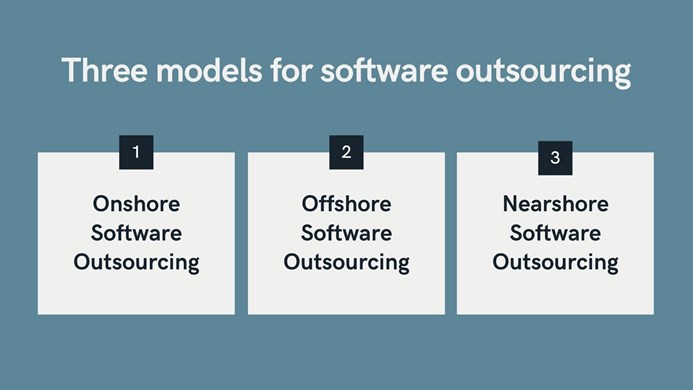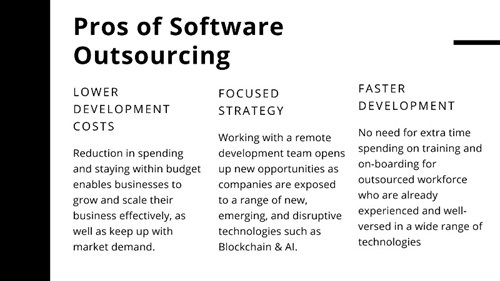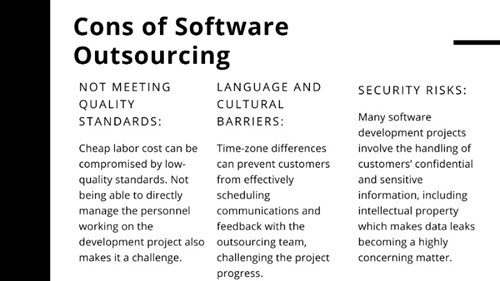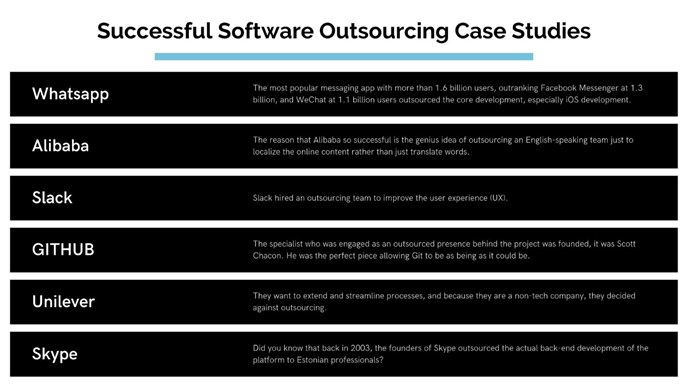
Software Outsourcing: 2020 - 2021 Guide
What is Software Outsourcing?
In its simplest sense, Software Development Outsourcing describes an arrangement, in which an organization chooses to hire an external software development agency to effectively carry out all the tasks of a software development project, that could be done in-house instead. Software outsourcing is about the practice of a company handing over the control of a certain business process or project to a third-party vendor that is qualified and capable of handling the required business tasks.

Based on a study about “IT functions outsourced worldwide 2017” - by Statista, surveying CIO worldwide - it was revealed that software application development was the most commonly outsourced IT function, as answered by 64% of respondents. Software outsourcing is, indeed, playing a key role in driving the continued growth of the global IT outsourcing business.
According to a recent report by Statista, in the year 2019, the global IT outsourcing market size amounted to a staggering amount of 66.52 billion U.S. dollars. And according to another report by Technavio about “IT Outsourcing Market by Service, End-user, and Geography - Forecast and Analysis 2020-2024”, it was predicted that the IT outsourcing market has the potential to grow by USD 98 billion during the forecast period of 2020-2024.
Such strong statistics imply the demand for software outsourcing will continue to rise, as business organizations are now on the quest to digitize and optimize their business processes, forming the basis of their organization’s digital transformation.
Nowadays, technology is evolving at a lightning speed where new technology of this year could probably become obsolete in the next. The competition is higher than ever, and as a result, it’s absolutely necessary that companies keep on evaluating and adapt to the new business trends, towards a cost-effective business model that includes offshore outsourcing as a viable solution to stay ahead of the competition.
The service of software outsourcing is increasingly becoming more and more popular with businesses choosing to outsource their development projects due to its many benefits, including effective development cost, and quick access to a large pool of IT tech talents. Software outsourcing is highly promising for business organizations that are looking to gain a competitive advantage by working with tech talents across the globe.
In this article, let’s consider in detail the current state of software outsourcing, and how to do it effectively.
Why is Software Outsourcing Important?
Outsourcing is cost-effective, and in particular - offshore software outsourcing helps lower development costs which essentially translates to lower market price and enhances competition. However, in recent years, according to a report by Deloitte and Dubai Outsource City, companies are starting to look toward software outsourcing to achieve a variety of business objectives, beyond just costs.
These days, IT decision-makers and business owners turn to outsourcing to make their companies lean and improve efficiency. By delegating, companies will be able to focus on their core competencies, keeping the long-term strategic priorities on the right track.
Next, let’s dive deeper into some of the common different software outsourcing services and engagement models, as follow: 
Software Outsourcing services
In 2020, when it comes to outsourcing, typical services usually include web and mobile application development services, as well as other innovative and advanced technologies of Cloud computing, Robotic Process Automation, and Artificial Intelligence - which are cementing their places in the industry and expected to have a considerable impact going forward.
Also, many software outsourcing vendors offer a comprehensive portfolio of services that cater to customer companies, meeting a wide range of their particular business needs, at any stage of customers’ project as well as during the entire development cycle - from planning to development, delivery, and product release, software outsourcing vendor can offer the necessary expertise and resources to ensure overall project success for their customers.
With software outsourcing, services are delivered under the remote operation models, which enable customers companies to work with top IT talents all over the world who are dedicated to working on their projects.
What are the models for software outsourcing?
There are certain ways for businesses to outsource their software projects to vendors across the globe, where the development centers can reside on-shore, offshore, and near-shore. Let’s consider in detail as follow:
Onshore Software Outsourcing
Onshore outsourcing refers to the act of customer companies working with development teams of software companies that are located in the same country. The advantage of onshore outsourcing is that there are virtually no language barriers which makes communication much easier and eventually, making outsourcing more effective. However, in return, customers may have to pay more for development costs.
Offshore Software Outsourcing
Offshore outsourcing means working with development teams in other countries. This is the most cost-effective option due to low labor costs, and also online communications channels (e.g. Emails, VoIP Phones, Zoom video conferences, etc.) making it possible to effectively manage software projects remotely.
Nearshore Software Outsourcing
Nearshore outsourcing companies work with customers in neighboring countries.
Why Outsource? The pros and cons of Software Outsourcing
Generally speaking, outsourcing software development allows business organizations to address the various challenges of reducing overheads spending, quickly build a remote tech team, and thereby speed up the product’s time-to-market. Below are some of the attractive benefits of software development outsourcing:
Software Outsourcing Advantages:

Lower development costs and reduce overhead spending
The most common reason leading businesses to outsource their development project is the drastic saving on development costs. Reduction in spending and staying within budget enables businesses to grow and scale their business effectively, as well as keep up with market demand. Thus, cost-saving remains the primary advantage for businesses to outsource their software development needs.
Besides, by contracting work to a third party, companies can cut down on their labor costs, including a variety of employee benefits such as insurance, training, leaves, and more - while paying outsourced teams at a competitive rate.
Outsourcing vendors usually determine the development cost based on the hourly rate of developers, in accordance with their seniority level, without taking into account the aforementioned expenses above - ultimately making the entire outsourcing endeavor more attractive for business organizations.
Flexibility
Customer companies can engage with software outsourcing vendors only when and if needed. Unlike permanent employment, there’s no legal bound or obligation of maintaining a long-term contract which offers customers the flexibility of having to pay for outsourcing during the project works. This is especially advantageous in comparison with hiring full-time in-house developers all year round, where their expertise may not be needed as much, after project completion.

In addition, cloud computing technology makes it easier than ever for people to work from home or anytime anywhere, making remote working gradually becomes the norm. Offshore remote working is more and more about human and machine interaction rather than micro human management. The location of remote developers is becoming a non-relevant factor in this day and age. Hiring remote IT tech talents to work on software projects is more attractive than ever.
Improve Business with a Focused Strategy
Working with a remote development team opens up new opportunities as companies are exposed to a range of new, emerging, and disruptive technologies such as Blockchain, Artificial Intelligence, and more which helps transfer the knowledge base and best-practice to internal teams effectively.
Having quick access to a large pool of IT talents on a large scale allows clients to implement their projects efficiently while having more time to focus on their core competencies. In particular, if customer companies are not in the IT industry, this offers significant benefits as it allows companies’ employees to have more time spent on other important tasks generating revenue such as sales and marketing, enhancing business growth and productivity.
Faster development and Speed up product time-to-market
Since the outsourced workforce is already experienced and well-versed in the technologies and tools required of the development process, there’s no need for extra time spending on training and on-boarding, saving customers a significant chunk of time to speed up the development process. Specifically, this is highly beneficial in the context of large international corporations, where the decision-making and approvals process might take much longer than usual.
Furthermore, changes that occurred will also be addressed quickly to ensure projects can move forward according to schedule. The remote development team is motivated to work quickly and deliver projects on time, providing customers a competitive edge over their competitors.
Cons of Software Outsourcing

Not meeting quality standards:
When hiring offshore software outsourcing companies, many of the times, the attractive aspect of cheap labor cost is compromised by low-quality standards. Such a risk is inherent when business organizations contracting an external agency to develop their software projects at a cost that is significantly lower than in the local market. Besides, not being able to directly manage the personnel working on the development project makes it a challenge to have full visibility into the process as well as to address the problems and providing feedback and guidance to move the project forward.
Language and cultural barriers:
Working with IT teams in a remote location could be quite a challenge sometimes due to language and cultural barriers. Furthermore, time-zone differences can also prevent customers from effectively scheduling communications and feedback with the outsourcing team, ultimately challenging the project progress updates due to lack of visibility and disruption and connecting. Gradually, the combining effects can put a strain on both parties and leave the project vulnerable to the threat of missing deadlines and/or extended timelines, ultimately leading to re-work or failure.
To avoid such a potential risk, it’s critical to establish frequent online meetings scheduled between clients and the remote team to keep the lines open and provide feedback during each stage to move projects forward.
Security risks:
Today, data is a new asset, and handing over business data to a 3rd party software outsourcing vendor could introduce risks for businesses. Many software development projects involve the handling of customers’ confidential and sensitive information, including intellectual property which makes data leaks becoming a highly concerning matter. Thus, it’s important that businesses planning to outsource should consider in detail data security risks and select the right software vendor who understands and places importance on security as well as having all the necessary measures to ensure the protection of their customers’ data in compliance with security laws and regulations.
Next, we are going to examine a few factors on how to outsource software development successfully.

How to outsource software development effectively?
There are numerous factors that influence the likelihood of success when it comes to software outsourcing. Among those, there are certain aspects which companies should keep in mind, including:
- Establish clear goals for outsourcing
- Involve in project management and collaborate with remote teams.
- Have realistic expectations.
- Set milestones and frequently track progress to provide feedback
Again, there’s no way to guarantee that an outsourcing project will become a hundred percent success. But there are certain things to do that can help companies improve the chance of success. Furthermore, customer companies should opt for outsourcing partners who apply Agile methodology in managing their development projects in a flexible way, to allow for better quality and more frequent release as well as improve collaborations. Additionally, employing advanced tools for efficient project task management is also highly recommended to help gain visibility into project progress.
Successful Software Outsourcing Case Studies That You Can Learn From
Since the COVID-19 pandemic outburst back in March this year, companies and employees have been working remotely. Within the U.S, 16 million workers started to work from home. Gartner's CFO survey revealed that nearly three in four CFOs plan to shift at least 5 percent of previously on-site employees to permanently remote positions post-COVID-19. The action is necessary.
Due to the current circumstances, companies are forced to work remotely using technologies to keep the business running, which results in the clear visibility of the increased number of successful outsourcing case studies. Business owners have already realized the importance of remote work and outsourcing during crises like this. Although there are arguments about the pros and cons of working remotely, it is indisputable that remote work and outsourcing are viable options for keeping the business running by leveraging the 4.0 digital technology.
According to the research, nearly 75 percent of companies outsource IT services, while 87 percent are planning to do so.
Outsourcing is becoming more desirable since there is a tech talent shortage. It also solves several problems like cutting software development costs, finding the needed specialists, business intelligence development, cloud-based services, building websites, etc.
Some of the companies mentioned below are some of the most successful case studies of outsourcing. Have a look at how they grow their businesses and outrun competitors on the global market via utilizing remote teams.
The most popular messaging app with more than 1.6 billion users, outranking Facebook Messenger at 1.3 billion, and WeChat at 1.1 billion users outsourced the core development, especially iOS development.
Whatsapp was founded back in 2009 by Brian Acton and Jan Koum after they had gotten rejected by Facebook, ironically. Because they wanted to optimize the costs, they hired a professional team from Eastern Europe to build all the core development. The project successfully took off to the top rankings on App Store, Google Play.
Alibaba
This Chinese multinational eCommerce technology conglomerate was started in 1999 by Jack Ma when companies were increasingly using websites for customer relations. The business outsourced developers from the U.S to create its website that would appeal to both locals and international customers, especially those in English-speaking countries. The reason that Alibaba is so successful is the genius idea of outsourcing an English-speaking team just to localize the online content rather than just translate words. The thought brought Jack Ma the status and Alibaba the global revenue that they are today.
Slack
When Slack first started its business, no one thought it would be a team collaboration tool that attracted 10 million users as it is now. It was like an Internet Relay Chat (IRC) inside a browser, and there are probably only a few people left who remember what the early prototype looked like. Among many similar systems, Slack turned out to be the most successful one. Slack hired an outsourcing team to improve the user experience (UX). This move has resulted in all consensus opinion claims that the way Slack looks, feels, and sounds are different from the competitor. Slack’s UX becomes its unique selling point. The outsourcing team came up with the general design concept to revamp the app, logo, and commercial website.
GITHUB
The American multinational corporation, which is a subsidiary of Microsoft since 2018, provides hosting for software development and version control. There aren’t any software developer who doesn’t know about Git. Forty million Git users use the website for version control, bug tracking, source code management. When it was founded, it was written in the Ruby on Rails framework, but soon it became clear that the solution was in much need of people who were extremely proficient in Git itself. The specialist who was engaged as an outsourced presence behind the project was founded, it was Scott Chacon. He was the perfect piece allowing Git to be as being as it could be.
UNILEVER
In 2005, Unilever, with approximately 200,000 employees worldwide and soon extended operations to dozens of countries, encountered the need to merge different ERPs across their sphere. They want to extend and streamline processes, and because they are a non-tech company, they decided against outsourcing. An ERP system integration project is vital for a company like Unilever. If Unilever does otherwise - recruiting a full-time IT engineer, spending money and time training, might have been detrimental to the company’s inner focus. ERP solution implementation is not an easy task. As of now, Unilever’s operations run smoothly thanks to the ERP system development outsourcing decision.
SKYPE
Did you know that back in 2003, the founders of Skype outsourced the actual back-end development of the platform to Estonian professionals? These professionals created what we know and use today. The video chat, instant messaging, and file transmission features are what make Skype one of the telecommunications application pioneers. After just two years, Skype was acquired by eBay for $2.5 billion, and in 2011, by Microsoft for $8.5 billion. This story is an inspiration and has drawn attention to the IT talent pool in Eastern Europe. “Skype” even becomes one of the verbs in the English language - ‘to skype someone,” which means to have a spoken conversation with someone via the Internet using Skype, also viewing by webcam. This dictionary entry speaks volumes about the triumph of the project.
Why Choose TP&P Technology?
At TP&P Technology, we have many years of successfully completing and delivering software development projects to clients across the globe.
TP&P Technology is among the leading software outsourcing companies in Vietnam providing quality software outsourcing services, catering to clients across the globe, for projects of any size and scope.
Get in touch today to learn more about our services!



